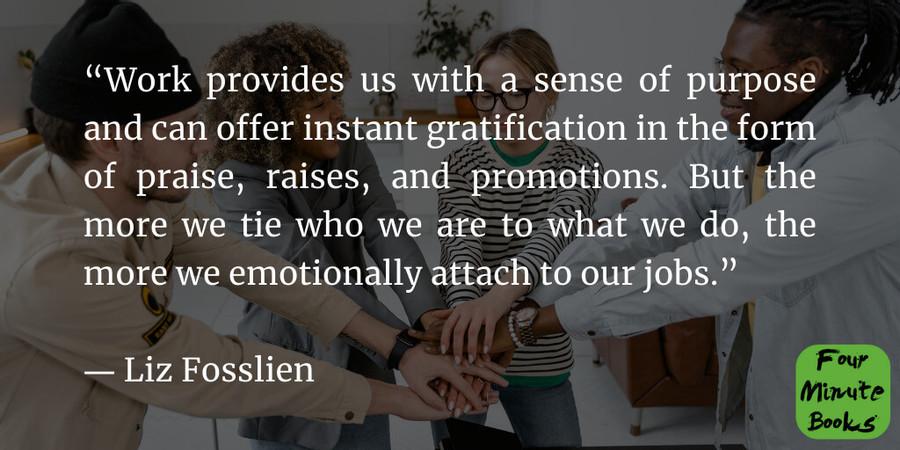No Hard Feelings Summary
Curated from: fourminutebooks.com
Ideas, facts & insights covering these topics:
14 ideas
·6.59K reads
22
Explore the World's Best Ideas
Join today and uncover 100+ curated journeys from 50+ topics. Unlock access to our mobile app with extensive features.
Book Summary
No Hard Feelings is a practical book for better managing the emotional side of work and building the skills needed to enhance your performance both within your role and more broadly throughout your career path by finding motivation again and managing negative emotions.
42
1.03K reads
Author Quote
"Work provides us with a sense of purpose and can offer instant gratification in the form of praise, raises, and promotions. But the more we tie who we are to what we do, the more we emotionally attach to our jobs.
43
933 reads
In today’s workplace, we’ve been taught to suppress our emotions and ignore them. We’re told that they don’t belong in the workplace, and if we feel something, we should just “get over it”.
But that’s not how emotions work. They are a part of us at all times, whether we want them to be or not. Even though they may seem like an obstacle to success in your career or your personal life, they are actually an asset: they make us human beings who can connect with one another and empathize with others’ experiences.
No Hard Feelings teaches us how to use emotions to our advantage and deal with negative feelings that may stand in the way of our professional growth.
40
595 reads
No Hard Feelings teaches us how to use emotions to our advantage and deal with negative feelings that may stand in the way of our professional growth.
40
562 reads
Top 3 Lessons From The Vook
- You can fix demotivation by taking time off, practicing self-care, and expressing your emotions.
- Emotions can be a great asset at work and in life if you know how to harness their power.
- Companies that create an environment with room for feelings perform better over time.
47
620 reads
Lesson 1: Showing emotions to your co-workers and indulging in those PTO days can help you regain a sense of purpose .
Whether we like it or not, emotions are an essential part of how people interact with each other at work. In fact, research shows that most people experience negative emotions at work on a regular basis. This can have a negative impact on their performance and well-being.
You can change that by being genuinely nice to your colleagues and showing emotion. Studies suggest that by doing so you contribute to a sense of belongingness and the humanization of the workplace.
43
473 reads
Leaders are crucial in developing authentic bonds at work within their teams by setting an example of how everyone should behave. Howard Schultz, the CEO of Starbucks, is known for expressing his emotions at work. However, if you do so, make sure not to seem fearful or vulnerable.
Being authentic in your display is alright, as long as your team doesn’t become fearful of the future of the company. Always keep your professionalism and have a well-thought-out plan to showcase. Another important aspect of work is time off.
45
379 reads
Lesson 2: Emotions can help you make better decisions .
Emotions are incredibly important for helping us make good decisions. They’re often the first thing that alerts us when something isn’t right—they help us detect danger and keep us safe. They also motivate us to act in ways that will help us achieve our goals.
Studies suggest that strong emotions, whether they’re good or bad, can help us make better decisions as investors. They’re also great at alerting us whether something will benefit our career path or not. For example, if you had an unpleasant experience in a financial role it’s hunlikely that you’d take a new job in a similar position.
43
332 reads
It all boils down to our emotions helping us if we know how to leverage our power. In a nutshell, you have to filter the relevant emotions from the irrelevant ones. The first type is a source of information.
For example, the feeling of regret or happiness that comes with a new task can tell you whether you should take it or not. A migraine or boredom in a meeting are examples of irrelevant feelings that you should let go of while engaged in something.
42
270 reads
Lesson 3: Organizations that foster learning and communicative environments are more successful in the long run .
Google conducted a study to determine which factors had the biggest impact on team performance, revealing that the most effective teams were the ones with increased psychological safety. So, why is that?
It seems that the science of psychology debunks it: teams who are friendly with each other, encourage unanimous contributions, value each member, and communicate with each other are the best contributors to a project.
People feel better in places where others value them. When you feel good, you perform well. It’s truly that simple! However, sometimes feeling like your best self in a team implies having awkward conversations as well.
Everyone hates being in an uncomfortable position, but sometimes having those conversations is better in the long run. If you have something to address, you need to learn how to put it out there, respectfully. Environments that facilitate these types of conversations are proven to have better results in the long run.
42
274 reads
People feel better in places where others value them. When you feel good, you perform well. It’s truly that simple! However, sometimes feeling like your best self in a team implies having awkward conversations as well.
Everyone hates being in an uncomfortable position, but sometimes having those conversations is better in the long run. If you have something to address, you need to learn how to put it out there, respectfully. Environments that facilitate these types of conversations are proven to have better results in the long run.
40
224 reads
No Hard Feelings - Book Review
No Hard Feelings provides you with the tools to understand your own emotions and those of others, as well as how to communicate them effectively without compromising your professionalism.
The book offers practical tips for managing anger, stress, and anxiety at work, while also providing guidance on how to regulate your emotions when faced with issues such as bullying or discrimination.
The book is a must-read for anyone who wants to develop their emotional intelligence and want to avoid disrupting their work-life balance disrupted ever again.
40
225 reads
Who would I recommend the No Hard Feelings summary to?
The 33-year-old employee who used to love their job but lost their motivation on the way, the 45-year-old manager who wants to foster a more positive environment, or the 50-year-old who finds it difficult to keep up with new trends and younger generations at work and is starting to dislike their job deeply.
40
277 reads
IDEAS CURATED BY
CURATOR'S NOTE
No Hard Feelings - Book Review
“
Tom Joad's ideas are part of this journey:
Learn more about career with this collection
How to use storytelling to connect with others
The psychology behind storytelling
How to craft compelling stories
Related collections
Similar ideas
11 ideas
Emotional Intelligence 2.0 - Book Summary
journeywithlyv.wordpress.com
16 ideas
75 Hard Summary
fourminutebooks.com
15 ideas
One Decision Summary
fourminutebooks.com
Read & Learn
20x Faster
without
deepstash
with
deepstash
with
deepstash
Personalized microlearning
—
100+ Learning Journeys
—
Access to 200,000+ ideas
—
Access to the mobile app
—
Unlimited idea saving
—
—
Unlimited history
—
—
Unlimited listening to ideas
—
—
Downloading & offline access
—
—
Supercharge your mind with one idea per day
Enter your email and spend 1 minute every day to learn something new.
I agree to receive email updates

